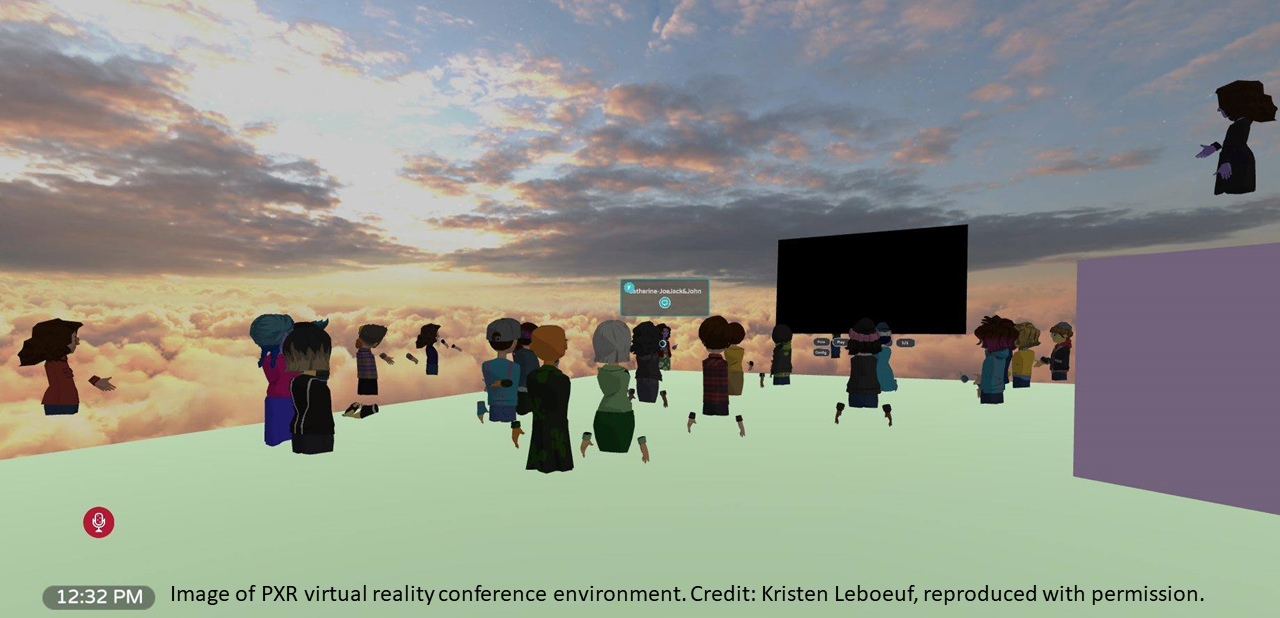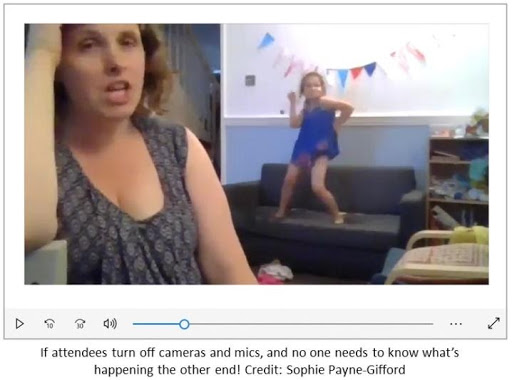Conferencing anywhere, anytime
Like many people able to work from home, my team meetings moved online in March 2020 but it took me until July to figure out online seminars and conferences. Maybe it took the world that long to put their seminars online?
Just a few I've attended include:
- September, I called into a conference on agri-tech economics to co-present on the way home from the school run.
- October, I watched/listened to Professor David Hughes give his hot take on the future of livestock and meat consumption while making dinner.
- November, I stayed tuned into my first online SRA training course while walking to the dentist. Karen O'Reilly didn't seem to mind, but maybe she was too surprised to be annoyed!
I've also given a number of presentations over Zoom and Teams.
Explore, branch out!
The options for online conferences have expanded since March 2020, beyond just watching someone talk through their PowerPoint slides (but then, I was doing that pre-lockdown as well). Now we're all network-connected on our personal devices, there are a number of creative ways of presenting research:
Professionally made video
Check out this combination of film and poetry (trigger warning, traumatic birth) on birthing decisions from previous contributor Gemma McKenzie. McKenzie premiered the film online as part of the ESRC’s Festival of the Social Sciences with audience discussion afterwards.
Live illustrating
Mari Greenfield commissioned Scriberia to ‘live scribe’ (also known as graphic recording) alongside presentations about COVID19 pregnancy experiences. The result is below (and free to use and redistribute with appropriate credit):
Virtual/Augmented Reality
Canadian playwright Alex Dault recently organised PXR 2020, a conference in virtual reality about using virtual reality for artistic performance. Imagine being able to 'walk' up to your research colleagues, have 'coffee' and chat research like you're next to them. Dault says this is what virtual reality conferences are like.

Top tips
Even given these developments, there are some basics to cover to make sure everyone gets the most out of an online conference.
Breaks are not networking
Do not call the breaks in an all-day conference 'Networking'. Most participants will use the opportunity to get up and move around: I make tea, unload the dishwasher, cook lunch. I have not yet hung around online to talk to someone.
Breaks
But, you definitely need breaks. Fifteen to twenty minutes for coffee breaks and forty-five for lunch is comfortable and I usually do something standing up for all of them.
Networking
And, you also need networking. I haven't met any of my colleagues in person in almost a year. And I have no opportunities to serendipitously meet people I might like to work with in the future. I've been having pre-meeting meetings just to be able to connect with people and chat research. For networking during online meetings, you will need to make it happen. There is little opportunity for it to happen spontaneously over coffee. Options include:
- Breakout rooms: Online breakout rooms (where three to five people are separated into online groups for a more intimate discussion) do a good enough job of this. I say 'good enough' because I usually forget everything we've discussed as soon as we're back (but if I brainstorm with someone in person I remember all their random details, like they work for the Office of National Statistics, they got up at 5am to get here and spent the train ride listening to podcasts).
- Share attendee details: As a balm to the forgettability of online breakout rooms, I'd like it if organisers could send out delegate details (with consent of course) before or after a meeting. This would also fix the lack of exchanging business cards that happens at in-person meetings.
- Meet-the-experts: Some online conferences have scheduled in one-to-one ‘meet the experts’ sessions for 15-20 mins, to replace the usual ‘coffee line chat’. They are bookable on a first-come, first-served basis and have been useful to both the experts and those seeking an audience. Three an hour with a five minute break in between is advised by creative methods researcher Helen Kara.
Back in the day when I had the luxury of attending in person conferences, I had form for skipping sessions. I never did the whole breakfast networking + 9am-6pm + gala dinner. Too exhausting! The online training I recently took started at 10:00 and finished around 15:30. It was the right length as I was flagging by then. And I'm sure if I'd continued much longer I would have had eye strain (anyone else get eye strain from too much Zoom time?)
Expect glitches
Things go wrong, we're used to it. If a participant has WiFi problems, ask them to turn their camera or audio off. If a contributor's mic is off, tell them. If a participant's mic is unintentionally on and you can hear their children/spouse/dog, remind participants to turn mics off. If a presentation won't 'share', email it to someone on the call that definitely can share.

Still need a chair
In-person conferences and seminars often have a chair to introduce the session and keep the presenter to time. You still need this person, but instead of keeping you to time, they might keep an eye on questions in the 'chat' box. They might also have all the presentation slides and click through for the presenters. Not everyone is a fan of this way of presenting, but it does guarantee your slides will show!
Maybe also a producer?
To keep on top of the chat, the tech, and the presentations, you might also have one or more 'producers' who manages the tech and chat while someone is presenting, and who is different to the 'chair' (who concentrates on the speakers).
Practice technical stuff
If it's your first time hosting, presenting, recording etc, it only need take ten minutes to practice in advance. For example, I discovered I can only audiorecord a Teams call if I've arranged it.
The event link
Put the event link in every e-mail you send to participants! In the registration e-mail, the day-before reminder, the hour-before reminder! I’ve almost given up attending events because I couldn’t easily find the event link.
Videocall literacy
Don’t forget that because you might be in Zoom calls all day every day not everyone is! I had a number of people not figure out how to attend a Teams presentation I’d organised because they weren’t up to date on the videocall revolution (they were parents on career breaks not having videocalls every day). Even worse, I’d closed my Facebook and e-mail accounts so I wouldn’t be distracted by notifications trilling and missed a bunch of messages of people asking how to access the event. They thought they could click on the page in Eventbrite and it would take them to a livestream link.
If you are engaging people not using videocalls on a regular basis, send them instructions for attending the event and for using the platform you have chosen and don’t close your e-mails, Facebook, twitter, Whatsapp etc.
I like to hope that the explosion of online conferencing also benefits people with other accessibility issues (yes, I consider my children an accessibility issue).
So please, meet me online! Seriously, I like chatting research and I miss people.
AUTHOR BIO: Sophie Payne-Gifford is a research fellow in sustainable food systems at the University of Hertfordshire and regular contributor to the SRA blog. Follow @GiffordPayne for tweets on food, environment, agriculture, parenthood, babies, and social research (yeah, I'm a mixed bag).